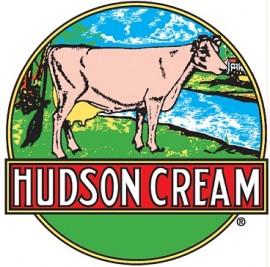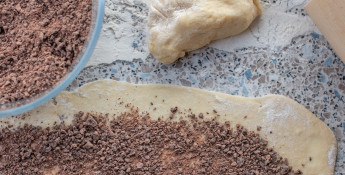By John Schlageck on November 9, 2015
Hudson Cream
The flour without a fault
Gleaming elevators tower above the wheat fields of the Kansas prairie at Stafford County Flour Mills. The silos are the same color as the mill’s rich white flour.
Located in the village of Hudson — population 100, counting dogs, cats and tumbleweeds — Stafford County Flour Mills (SCFM) may be the only remaining independently owned mill in the country.
Today, as it has for 110 years, the mill specializes in producing premium-quality flour for the home baker. Throughout its storied history, this product has become known as “the flour without a fault.”
The “Hudson Cream” brand name was adopted to describe the white richness of the mill’s flour. It’s easy to find the distinctive sack design of Hudson Cream Flour on the grocer’s shelves. The enduring logo features a golden Jersey cow standing in a green meadow by a bright blue stream.
As Al Brensing, former president of SCFM, used to say, “When Mr. Krug started the mill, everybody owned milk cows, chickens and hogs. Many people believed the Jersey cow gave the richest milk and cream, so the Jersey cow was selected for the logo.”
The Name
Throughout the years, the quality of the cow’s cream has become symbolic of the quality of the mill’s flour. While more and more Kansans continue to discover and use the flour for baking, West Virginia remains the number one buyer of the self-rising flour used primarily for biscuits, pancakes and waffles.
Nearly half of Hudson Cream Flour winds up in the Appalachian Mountains area, says Reuel Foote, who serves as general manager and president of the company today. Other flour is delivered to restaurants and school lunch programs. To address the trend toward healthier diets, Stafford County Flour Mills added whole-wheat flour to their product line more than 20 years ago. This line was added to fill a niche market of customers who wanted more fiber in their diets. A certified organic product is also available in grocery stores.
To address the trend toward healthier diets, Stafford County Flour Mills added whole-wheat flour to their product line more than 20 years ago. This line was added to fill a niche market of customers who wanted more fiber in their diets. A certified organic product is also available in grocery stores.
To make quality flour, the mill prefers using a heavy-test-weight wheat — 60 pounds or more. The protein level must also test high — at least 12.5 percent. SCFM uses a “short-patent” milling process, which results in a more refined flour, with all of the lower quality flour removed in the milling process. What’s left is the very finest flour that comes from the wheat berry.
“The result is a flour that is smoother in texture and produces cookies, breads, pie crusts and other baked products that are consistently light and fluffy,” Foote says.
Customer Service
Creating a quality product and selling it at a fair price has keyed the mill’s success for more than a century.
“When our customers want flour on Tuesday, they receive flour on Tuesday — not Wednesday or two or three days later,” Foote emphasizes. “If our flour isn’t at the warehouse within two hours of the promised arrival, they call. I don’t want to answer that kind of call.”
While SCFM will always make the best flour available, today’s biggest challenge remains enticing bakers to sample their product.
“If they try our flour, they’ll buy our flour,” Foote says.
Aware of the ever-changing consumer landscape and fewer home bakers today, SCFM will soon be shipping two-pound bags to grocers around the country.
With today’s hectic schedules, moms and dads shuttle children to school, sporting events, the doctor and everywhere else. This leaves little time to cook meals and bake those wonderful comfort foods everyone loves. Others never learned how to bake.
“We’re banking on shoppers buying smaller quantities knowing they don’t bake as often, but when they do, they may use less flour and have less left over,” he continues. “And they can buy fresh product as needed.”
Shoppers also like to know where their food comes from. They like to know who produces the food they eat and serve to their families. With Hudson Cream Flour, today’s home baker can trace their biscuits, cookies, cakes and donuts from the farm to the table.
Kansas Grown
More than 95 percent of the wheat milled at Stafford County Flour Mills comes from 75–80 farm families in Stafford County. On those rare occasions when local farmers do not produce enough wheat, or the quality is below par, SCFM will truck in high protein wheat from western Kansas.
The mill requires at least 1.5 million bushels annually. Many of these same farm families have supplied Hudson Cream with wheat for generations.
In addition to the wheat suppliers, many of the employees at the mill live within a 12-mile radius. Like the early founders of the company, some of these employees have worked for the company for years and are proud of the rich milling heritage.
"The strength of the company remains its people," Foote says. "From the beginning, everyone who's worked here believes in Hudson Cream Flour."
Two years ago, Stafford County Flour Mills erected an 850-kilowatt wind turbine south of the site in Hudson.
“As far as we know, we’re the only flour mill that has the physical capability to run on 100 percent sustainable energy,” Foote says. “We strive to be good stewards of our resources just like the farmers who supply us and the customers who buy our flour.”
As Stafford County Flour Mills continues to evolve and grow, this privately owned company remains committed to producing the same high-quality flour.
“If we can’t do this, we won’t expand,” Foote says. “We take no one for granted. Every customer is important and every sack of Hudson Cream Flour is the same as the next.”
You might like this recipe:




